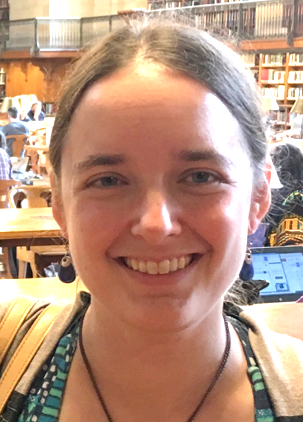Diana Parno
Falco-DeBenedetti Associate Professor of Physics
Nuclear & Particle Physics
Neutrino Physics
Wean Hall 8414

Education & Professional Experience
Ph.D.: Carnegie Mellon University (2011)
Professional Societies:
American Physical Society
Associate Professor, Carnegie Mellon University, 2022--2024
Assistant Professor, Carnegie Mellon University, 2018--2022
Assistant Research Professor, Carnegie Mellon University, 2017–2018
Research Assistant Professor of Physics, University of Washington, 2016
Associate Director, CENPA, University of Washington, 2014–2016
Acting Assistant Professor of Physics, University of Washington, 2014–2016
Post-doctoral research: University of Washington, 2011–2014
Honors & Awards
DOE Early Career Award (2021)
Research Interests
My primary research interest is in the physics of the neutrino, a fundamental particle that is generated in particle decays and nuclear reactions and that, in the Standard Model of particle physics, interacts only via the weak force. At Earth's distance from the Sun, about 65 billion solar neutrinos pass through every square centimeter every second, and the vast majority of them pass right through the planet. Neutrinos interact with matter so rarely that they were originally assumed to be massless, but in the last two decades several clever experiments showed that neutrinos do have a small but nonzero mass. Furthermore, despite its small magnitude, the mass of the neutrino has made an imprint on a cosmic scale: vast numbers of neutrinos were created in the early universe, and their collective mass affected the way that early structures formed. Neutrinos provided the first evidence of physics beyond the Standard Model in the electroweak sector, and they provide a bridge between very small scales and very large ones.
To better understand the properties of the neutrino, I use the kinematics of tritium beta decay to study the absolute neutrino-mass scale with the KATRIN experiment based in Karlsruhe, Germany, and I study low-energy neutrino interactions with matter with the COHERENT experiment based at Oak Ridge National Laboratory in Tennessee. Through detailed measurements and careful analysis, both COHERENT and KATRIN test the edges of the Standard Model while providing input to astrophysics and cosmology. I am an Analysis Co-Coordinator for both experiments and also serve as KATRIN's US spokesperson. I am also one of two PIs on the TRIMS experiment to better understand the molecular physics of gaseous tritium sources.
Recent Publications
D. Akimov et al. (COHERENT collab.), Simulating the neutrino flux from the Spallation Neutron Source for the COHERENT experiment, Phys. Rev. D 106 032003 (2022)
D. S. Parno, A. W. P. Poon, and V. Singh, Experimental neutrino physics in a nuclear landscape, Phil. Trans. Royal Soc. A 382 20230122 (2024)
Alexey Lokhov, Susanne Mertens, Diana S. Parno, Magnus Schlösser, and Kathrin Valerius, Probing the Neutrino-Mass Scale with the KATRIN Experiment, Annu. Rev. Nucl. Part. Sci. 72 259 (2022)
M. Aker et al. (KATRIN collab.), KATRIN: status and prospects for the neutrino mass and beyond, J. Phys. G 49 100501 (2022)
D. Akimov et al. (COHERENT collab.), Simulating the neutrino flux from the Spallation Neutron Source for the COHERENT experiment, Phys. Rev. D (in press) (2022)
M. Aker et al. (KATRIN collab.), Direct neutrino-mass measurement with sub-electronvolt sensitivity, Nature Phys. 18, 160 (2022)
M. Aker et al. (KATRIN collab.), Analysis methods for the first KATRIN neutrino-mass measurement, Phys. Rev. D 104 012005 (2021)
D. Akimov et al. (COHERENT collab.), A D$_2$O detector for flux normalization of a pion decay-at-rest neutrino source, JINST 16 P08048 (2021)
Y.-T. Lin et al. (TRIMS collab.), Beta decay of molecular tritium, Phys. Rev. Lett. 124 222502 (2020)
M. Aker et al. (KATRIN collab.), An improved upper limit on the neutrino mass from a direct kinematic method by KATRIN, Phys. Rev. Lett. 123 221802 (2019)
K. Altenmüller et al. (KATRIN collab.), Muon-induced background in the KATRIN main spectrometer, Astropart. Phys. 108, 40 (2019)
M. Arenz et al. (KATRIN collab.), First transmission of electrons and ions through the KATRIN beamline, JINST 13, P04020 (2018)
D. Akimov et al. (COHERENT collaboration), Observation of coherent elastic neutrino-nucleus scattering, Science 357, 1123 (2017)
L.I. Bodine, D.S. Parno, and R.G.H. Robertson, Assessment of molecular effects on neutrino mass measurements from tritium β decay, Phys. Rev. C 91, 035505 (2015)
More Publications:
ORCID Researcher ID